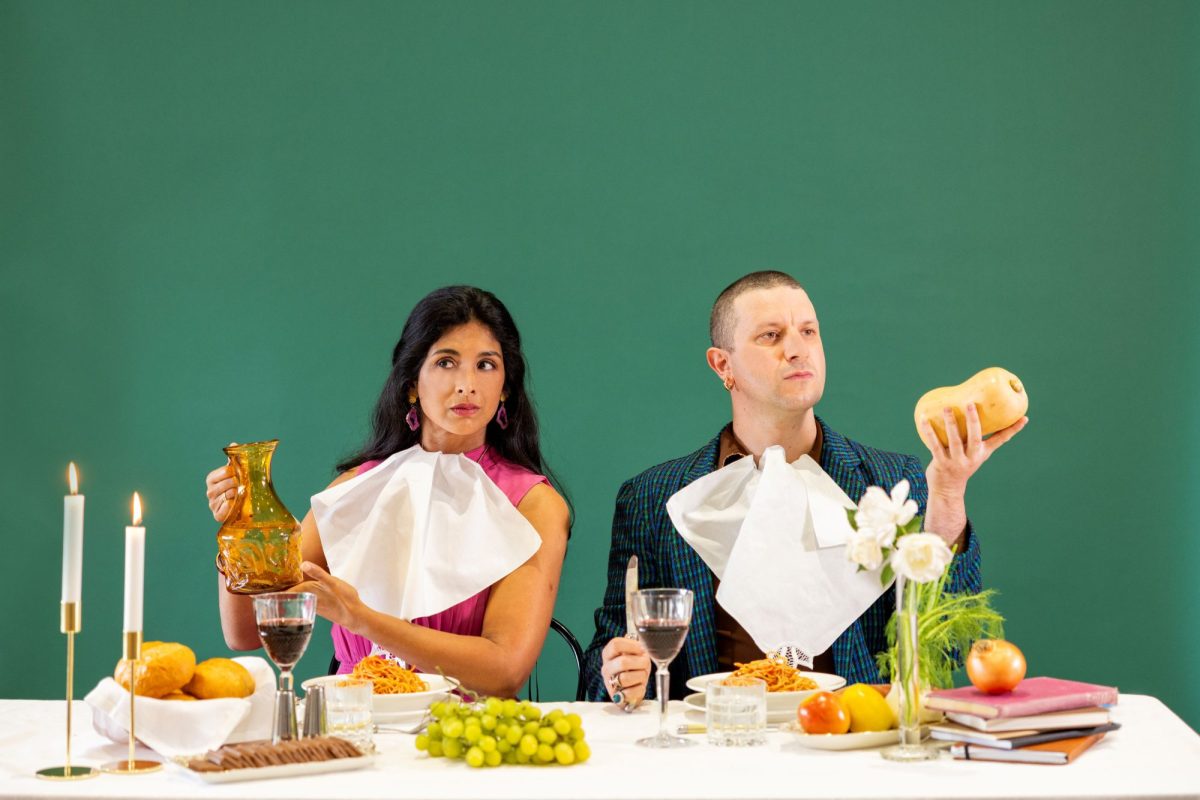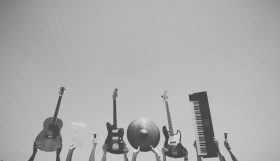‘We’re all good people,’ said Sonya Suares, one of the members of theatrical collective The People, in Peacemongers. Then why is our world in so much trouble? And how can we – as good people, with good intentions – make it better? It is from this thought experiment that this new co-devised part-Socratic dialogue, part-introspective psychological and emotional meta work commenced.
Peacemongers began its formation in 2020 and, after a number of delays and challenges (COVID, numerous funding application rejections, one of the cast members pulling out), the ensemble has embraced their creative context, devising a play about the very process of its own creation.
The audience was led into a large room, the actors jovially welcoming us and guiding us to our seats. The large space was set up with tables in a large ‘U’ shape, facing inwards towards a slightly raised stage with a backdrop of a pink-lit cloud-filled sky, a checkerboard of grass at the centre. Dinner was going to be served at this performance, so it felt like some sort of liminal last supper. A family function in fairyland.
The performers told us what to expect – that this show was about the process of its own creation – but forewarned that it was a failed project. The plan, at the outset, was to investigate all that was wrong with the world. This rather grim idea evolved into a plan to focus on the positives and devise their own Utopia: what would a world look like where inclusivity and care rather than division and hatred rule?
The audience was let into the process of the devising of the work from 2020 until today, through filmed and audio recordings and, later, a staged reading of one of their rehearsals. The actors addressed the audience directly – there was no fourth wall here – and the pace was kept up with audience interaction, shifts between media (two large screens set at the sides of the back of the stage were used to project a live camera feed from a roving videographer on stage, as well as prerecorded segments of dialogue from one of the original cast members (Kate Hood, who was not present in the show).
The show involved some song and dance numbers, musical style. Look, I’m pro-musical, but some of these songs did feel a bit tacked on and a convention the actors used to “fast forward” details of exposition so “things didn’t get too boring”.
In one of the audio recordings of an early rehearsal, the group talked about the type of work they wanted to create. They talked about generating a feeling: one of a warm embrace, where, for a period of time, the actors and audience would feel part of something special, held together, comfortable, in harmony.
Throughout the show, the audience was fed dinner from a local social enterprise Moon Rabbit. There was something really simple and brilliant about feeding an audience with a show about human connection and the idea of creating a better world. For all the apparent glossy-eyed optimism of the performers’ Utopian endeavour, it is true that the act of a group of strangers sharing a meal together holds a special power. It evokes in the space the histories of shared meals past, of this simple ritual that is about communion and care, nourishment and nurture.
The inevitable conflict arose when the group started to try and nut out how their Utopia would work in practice. They began with a list of what would be “in” and what would be “out”. In were massages, out was bigotry. Seems simple enough. But what happens when one person’s views conflict with those of another? What then? This was played out in a mock “new world trial” involving a cake-maker who refused to make a cake for a gay client’s wedding, because being gay was against their religion. You may remember this story from the news – the ruling happened in Colorado last year.
Using their “new world” method of acting out each role and talking it out, the group tried to understand each character’s position, and come to an agreement between parties in a respectful way. A challenging ask, when Sam was asked to play the cake-maker, a position he clearly found very difficult to internalise.
Ibi helped him out, explaining – in his role as cake-maker – how he felt that he would go to hell if he made the cake for a gay client (played via video by Kate Hood). The idea of this mock trial wasn’t a bad one, as it showed the performers grappling with ideas they find challenging, although it pretty quickly highlighted the reasons (in our “old world”) why we have anti-discrimination laws.
The group’s Utopian vision seemed bound in a point of contention between two of the performers: Sam, who continually said: ‘I just don’t want anyone to feel uncomfortable’ and Sonya, who said: ‘We can’t expect everyone to be comfortable all the time’.
Although they stuck to relatively beige topics of conflict in their plan for their Utopia, it was through their open-hearted approach to wrestling with some of the nitty gritty that they invited us as an audience to consider the basis of our ethical principles, and attempt to work out how to fix what isn’t working.
While the performers said that their objective failed – they weren’t able to create a Utopia – they did succeed in their intention to create a harmonious and respectful space for the actors and audience to share. Peacemongers was a thoughtful work of theatre that invited reflection and encouraged empathy – something we all need more of in the world right now.
But for all the talk of individuals’ comfort – it must be remembered that the theatre is a great place for experiencing discomfort, and it is a powerful tool in drama. The denouement – a moment of conflict where Sam, who is Māori, decided he didn’t want bigots in his Utopia and then walked out, finally killing the Utopian vision – felt lacklustre and unconvincing.
While we may all be good people, with good intentions, as the philosopher John Stuart Mill said, ‘Bad men need nothing more to compass their ends, than that good men should look on and do nothing.’ For all their Socratic approach to devising a new world, it felt like the end of the work arrived at the conclusion: ‘Oh well, we can’t work it out; making things better is tricky, so let’s have some biscuits together.’ Nice, but perhaps when the objective is ambitious, the ending could hit a bit harder.
Read: Book review: Model Minority Gone Rogue, Qin Qin
It’s great to feel connected, safe and understood, but I’m on Sonya’s side: it’s OK – and necessary, in the theatre – to feel uncomfortable sometimes.
Peacemongers by Morgan Rose
Darebin Arts Speakeasy
Co-created by: Samuel Gaskin, Kate Hood, İbrahim Halaçoğlu, Sonya Suares, Zachary Pidd, Katrina Cornwell and Morgan Rose
Director: Katrina Cornwell
Producer: Flick
Musical Director: Zachary Pidd
Set and Costume Design: Nathan Burmeister
Sound and AV Design: Justin Gardam
Lighting Design: Rachel Lee
Assistant Director: Meg Taranto
Composition: Zachary Pidd with İbrahim Halaçoğlu, Sonya Suares and Samuel Gaskin
Production Stage Manager: Harry Dowling
Assistant Stage Manager: Ella Curtis-Webster
Performers: Samuel Gaskin, Kate Hood, İbrahim Halaçoğlu, Sonya Suares, Mia Boonan and Zachary Pidd
Peacemongers was performed from 24 April-2 May 2024.





